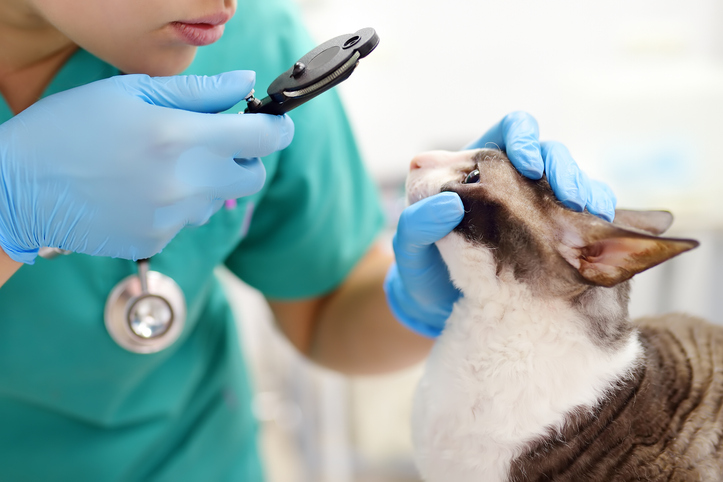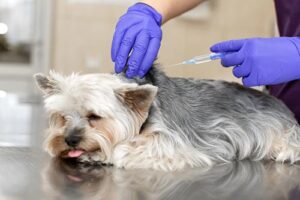8 Reasons Your Cat’s Eye is Watering
Despite having a reputation for being distant and independent, they still need regular care and attention from their owners. One common issue that cat owners may notice is when their cat’s eyes start to water excessively. While some watering of the eyes is normal, excessive watering can be a sign of a more serious underlying issue. Here are eight possible reasons why your cat’s eye is watering:

1. Allergies
Just like humans, cats can be allergic to various substances in their environment. Allergies can cause a range of symptoms, including watering eyes. Common allergens for cats include pollen, dust, and certain foods. If you suspect that your cat may be experiencing an allergic reaction, it is important to speak with your veterinarian to determine the cause and possible treatment options.
2. Eye Infections
Cats of all ages can develop eye infections, which can be brought on by a variety of germs or viruses, such as the feline herpes virus, which causes pinkeye. Although there are vaccine shots that can lessen and prevent the effects the virus will always be present in the body. Redness, discharge, and excessive eye watering are signs of an eye illness. If you suspect that your cat may have an eye infection, it is important to seek veterinary care as soon as possible, as untreated infections can lead to serious complications.
3. Blocked Tear Ducts
Tear ducts are responsible for draining excess tears from the eye. If the tear duct become blocked, tears can build up and cause excessive watering of the eyes. In some cases, blocked tear ducts can be treated with medication or surgery.
4. Corneal Ulcers
Corneal ulcers are open sores on the surface of the eye that can cause redness, discharge, and excessive watering of the eyes. Corneal ulcers can be caused by a variety of factors, including trauma, infections, and underlying medical conditions. Treatment for corneal ulcers may include medication or surgery, depending on the severity of the ulcer.
5. Conjunctivitis
Conjunctivitis, also known as pink eye, is a common condition that can cause redness, discharge, and excessive watering of the eyes. Conjunctivitis can be caused by a variety of factors, including bacterial or viral infections, allergies, or irritants. Treatment for conjunctivitis may include medication or other treatments to manage the underlying cause of the condition.
6. Yellow or Greenish Discharge
Sticky discharge from your cat’s eyes can be a sign of an illness. If the discharge is green and yellow, it indicates bacterial infection while a clear discharge is commonly indicative of viral infection. Early detection and treatment can prevent future, more serious problems. Ophthalmic medications such as gels, drops, and ointments can be used to address bacterial infections.
7. Glaucoma
Glaucoma is a serious eye condition that occurs when the pressure inside the eye increases, causing damage to the optic nerve. Glaucoma can cause a range of symptoms, including excessive watering of the eyes, as well as vision loss and other complications. Treatment for glaucoma may include medication or surgery to manage the pressure inside the eye.
8. Epiphora
Excessive tearing in cats is commonly indicated as “epiphora.” It’s a particular state of more severe feline illness and other medical problems rather than a disease.
A cat will typically make specific collections of tears to lubricate its eyes. The nasolacrimal channels, which connect to the nose, act as drains for the excessive liquid. Through this cycle, any remaining foreign objects that were caught in tears are removed, keeping the eyes consistently moist. However, if the tear ducts become blocked during the process, this liquid cannot be retained and epiphora may occur instead. It may make the skin around the eyes irritated and create dinginess in the eyes.
Veterinarians can use special tools to clear obstructed nasolacrimal ducts. In the rare circumstance that epiphora was caused by immature tear ducts or a more complex condition, such as entropion, surgery may be required as a form of treatment. While your cat is sedated, flushing techniques and cautious medications are administered.
Other Factors That Can Cause This
In addition to these possible causes, there are other factors that can contribute to excessive watering of the eyes in cats. These include exposure to irritants, such as smoke or chemicals, as well as certain underlying medical conditions, such as dry eye or immune-mediated diseases.
Cats with short noses undoubtedly experience itchy conjunctiva and ocular discharge such as Persian cats. If the nasolacrimal duct is blocked, the veterinarian can identify it with a quick examination. In this situation, surgery is not a viable option.
Treatment
If you notice that your cat’s eyes are watering excessively, it is important to seek veterinary care as soon as possible. Your veterinarian can perform a thorough examination to determine the underlying cause of the watering and recommend appropriate treatment options. Early detection and treatment are crucial for ensuring the best possible outcome for your cat’s health and well-being.
In some cases, simple home remedies may help alleviate mild watering of the eyes in cats. For example, you can gently clean your cat’s eyes with a warm, damp cloth to remove any discharge or debris. You can also try using a humidifier to increase the moisture in the air, which can help alleviate dry eyes and reduce excessive watering. However, for cases like entropion (rolled eye lid) and ectropion your vet will recommend possible therapy. As a cat owner, it is important to be aware of your cat’s behavior and health status. By observing changes in your cat’s eyes and seeking prompt veterinary care, when necessary, you can help and ensure that your cat stays healthy and happy for years to come.
Seek Veterinary Care if Your Cat’s Eyes are Watering
Excessive watering of the eyes in cats can be a sign of a variety of underlying issues. By understanding the possible causes and seeking prompt veterinary care when necessary, you can help ensure that your cat stays healthy and happy. Regular check-ups with your veterinarian and preventive care measures can also help maintain your cat’s overall health and well-being.
In addition to seeking veterinary care, there are steps you can take to prevent eye issues in your cat. Keeping your cat’s environment clean and free of irritants can help reduce the risk of infections and other eye issues. Additionally, feeding your cat a healthy diet and providing regular exercise can help maintain overall health and reduce the risk of underlying medical conditions. For more information, or if you would like to schedule an appointment, contact Best Friends Animal Hospital by calling 603-625-2378. Our veterinarians in Manchester, NH will give your cat the best care.





